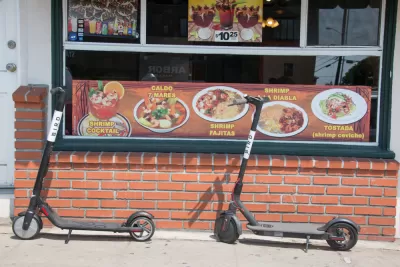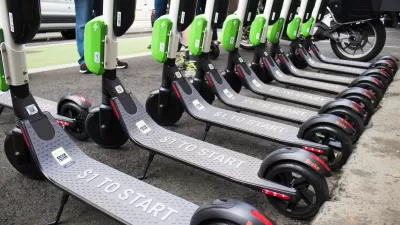Months after ending a program to help cities fund transportation infrastructure improvements, a company official says city governments were misusing the funds.

"Micromobility firm Bird quietly phased out a program to help cities pay for protected bike lanes and improve infrastructure earlier this year over concerns about how the money was being spent," reports Jason Plautz.
Maurice Henderson, the company’s director of government partnerships, confirmed the news at the Colorado Smart Cities Symposium, held in Denver in August.
"The program had been established to set aside $1 per scooter per day to pay for bike lane maintenance," according to Plautz.
Angie Schmitt broke the news of the program's demise in January.
"Henderson said during a panel discussion that the company found 'most cities were taking the dollars they were getting out of the program and plugging budget holes as opposed to plugging potholes.'"
FULL STORY: Bird shutters bike lane program due to misuse of funds

Planetizen Federal Action Tracker
A weekly monitor of how Trump’s orders and actions are impacting planners and planning in America.

Maui's Vacation Rental Debate Turns Ugly
Verbal attacks, misinformation campaigns and fistfights plague a high-stakes debate to convert thousands of vacation rentals into long-term housing.

Restaurant Patios Were a Pandemic Win — Why Were They so Hard to Keep?
Social distancing requirements and changes in travel patterns prompted cities to pilot new uses for street and sidewalk space. Then it got complicated.

In California Battle of Housing vs. Environment, Housing Just Won
A new state law significantly limits the power of CEQA, an environmental review law that served as a powerful tool for blocking new development.

Boulder Eliminates Parking Minimums Citywide
Officials estimate the cost of building a single underground parking space at up to $100,000.

Orange County, Florida Adopts Largest US “Sprawl Repair” Code
The ‘Orange Code’ seeks to rectify decades of sprawl-inducing, car-oriented development.
Urban Design for Planners 1: Software Tools
This six-course series explores essential urban design concepts using open source software and equips planners with the tools they need to participate fully in the urban design process.
Planning for Universal Design
Learn the tools for implementing Universal Design in planning regulations.
Heyer Gruel & Associates PA
JM Goldson LLC
Custer County Colorado
City of Camden Redevelopment Agency
City of Astoria
Transportation Research & Education Center (TREC) at Portland State University
Jefferson Parish Government
Camden Redevelopment Agency
City of Claremont





























